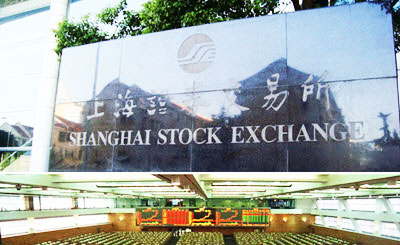SANGHAI COMPOSITE LOOKS POSITIVE AMID ECONOMIC WOES

The Shanghai Composite Index soared 32 points or 0.9% to close at 3,468 on September 30th, boosted by reports that Beijing committed to coal supply ahead of the winter. Meantime, the PBoC today injected a total of CNY 100 billion into the banking system, the 10th straight day of cash injections. For the month, however, the index was almost flat, as traders digested mixed economic data from China that showed factory activity unexpectedly shrank while the services sector recovered strongly.
China risks slower growth if it does not do enough to spur market competition by allowing the private sector to play a bigger role in the economy and greater two-way flow in cross-border investments, a report showed on Tuesday. Without a market-oriented shift, China will struggle to maintain a growth potential that exceeds 3% annually by the middle of this decade. Chinese reform advocates say Beijing has been avoiding potentially disruptive changes due to worries over economic and social stability and resistance from vested interests such as powerful state-owned companies, which Xi has described as the champions of the economy. Economic growth has gradually eased from 2011 to 2020, expanding in the single-digits compared with the relatively big gains in the years just after it joined the World Trade Organization in late 2001. China has set a target to grow its economy by at least 6% in 2021 after it managed to eke out growth of 2.3% in pandemic-hit 2020.While China has made progress in some areas such as trade, where it has cut tariffs to a level comparable with or below those of OECD economies, recent policy signs are at odds with a market-oriented course.
Evergrande debt crisis
Cash-strapped China Evergrande Group's possible sale of a stake in a unit to raise as much as $5 billion, more Chinese property developers grappled with ratings downgrades on worries about their ability to repay debt. Evergrande is facing one of the country's largest-ever defaults as it wrestles with more than $300 billion of debt. The company last month missed making coupon payments on two dollar bond tranches.
The possible collapse of one of China's biggest borrowers has triggered worries about contagion risks to the property sector in the world's second-largest economy, as its debt-laden peers are hit with rating downgrades on looming defaults. Chinese developer Sinic Holdings (Group) Co Ltd became the latest to be downgraded by Fitch Ratings on Tuesday on uncertainty over the repayment of its $246 million bonds maturing Oct 18.Sinic's long-term issuer default rating was cut to 'C' from 'CCC', and came after the company announced that certain subsidiaries have missed interest payments on onshore financing arrangements, Fitch said in its report.
The move comes amid persistent uncertainty over the fate of Evergrande, once China's top-selling developer and now set to be one of the country's biggest restructuring exercises. The company on Monday requested a halt in the trading of its shares in Hong Kong pending an announcement about a major transaction. Evergrande Property Services Group , a spin-off listed last year, also requested a halt and said it referred to "a possible general offer for shares of the company."
China's state-backed Global Times said Hopson Development was the buyer of a 51% stake in the property business for more than HK$40 billion ($5.1 billion), citing unspecified other media reports. Hopson also said it had suspended its shares, pending an announcement related to a major acquisition of a Hong Kong-listed firm and a possible mandatory offer. Separately, Chinese homebuilder Fantasia Holdings' dollar-denominated bonds lost nearly half their market value in a massive Monday selloff, after it said it had failed to make a $206 million international market debt payment on time.
An index of China high-yield debt, which is dominated by developer issuers, hit its lowest since the pandemic drawdown in 2020 on Monday, and has lost almost 20% since May - while comparable U.S. and European indexes have rallied.


